| << Chapter < Page | Chapter >> Page > |
Like its European allies, Japan was intent upon creating an empire for itself. In 1931, it created a new nation, a puppet state called Manchukuo, which had been cobbled together from the three northernmost provinces of China. Although the League of Nations formally protested Japan’s seizure of Chinese territory in 1931 and 1932, it did nothing else. In 1937, a clash between Japanese and Chinese troops, known as the Marco Polo Bridge Incident, led to a full-scale invasion of China by the Japanese. By the end of the year, the Chinese had suffered some serious defeats. In Nanjing, then called Nanking by Westerners, Japanese soldiers systematically raped Chinese women and massacred hundreds of thousands of civilians, leading to international outcry. Public sentiment against Japan in the United States reached new heights. Members of Protestant churches that were involved in missionary work in China were particularly outraged, as were Chinese Americans. A troop of Chinese American Boy Scouts in New York City’s Chinatown defied Boy Scout policy and marched in protest against Japanese aggression.
President Franklin Roosevelt was aware of the challenges facing the targets of Nazi aggression in Europe and Japanese aggression in Asia. Although he hoped to offer U.S. support, Congress’s commitment to nonintervention was difficult to overcome. Such a policy in regards to Europe was strongly encouraged by Senator Gerald P. Nye of North Dakota. Nye claimed that the United States had been tricked into participating in World War I by a group of industrialists and bankers who sought to gain from the country’s participation in the war. The United States, Nye urged, should not be drawn again into an international dispute over matters that did not concern it. His sentiments were shared by other noninterventionists in Congress ( [link] ).

Roosevelt’s willingness to accede to the demands of the noninterventionists led him even to refuse assistance to those fleeing Nazi Germany. Although Roosevelt was aware of Nazi persecution of the Jews, he did little to aid them. In a symbolic act of support, he withdrew the American ambassador to Germany in 1938. He did not press for a relaxation of immigration quotas that would have allowed more refugees to enter the country, however. In 1939, he refused to support a bill that would have admitted twenty thousand Jewish refugee children to the United States. Again in 1939, when German refugees aboard the SS St. Louis , most of them Jews, were refused permission to land in Cuba and turned to the United States for help, the U.S. State Department informed them that immigration quotas for Germany had already been filled. Once again, Roosevelt did not intervene, because he feared that nativists in Congress might smear him as a friend of Jews.

Notification Switch
Would you like to follow the 'U.s. history' conversation and receive update notifications?